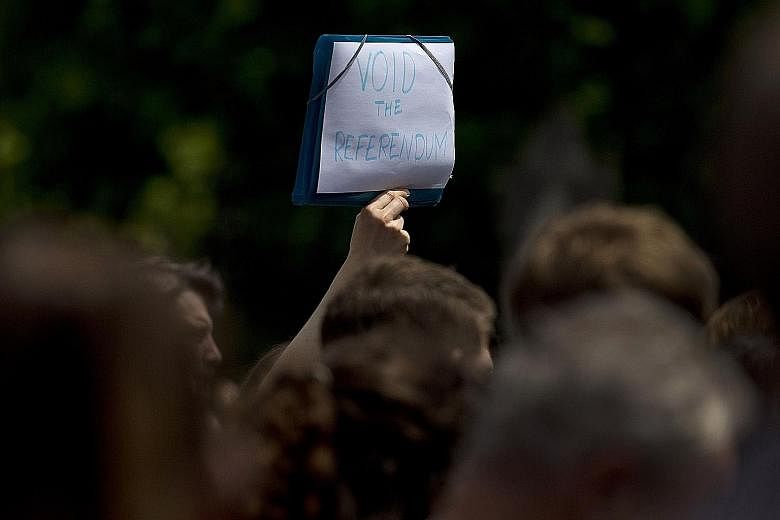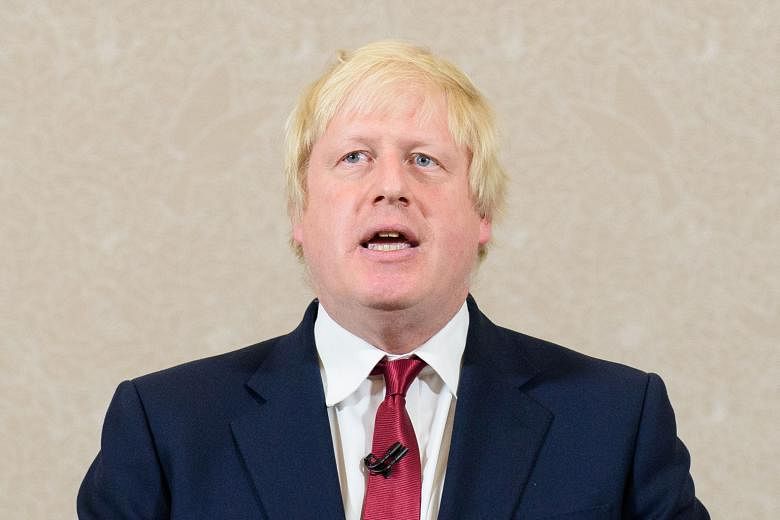Early last month, British politician Michael Gove, one of the leading proponents of Brexit, was asked in a television interview to name an economist who backed the idea of Britain's withdrawal from the European Union (EU).
His answer: "I think people in this country have had enough of experts."
The referendum result went Mr Gove's way, as popular resentment of elites ruled the day.
Experts warned of economic uncertainty, market turmoil and a plummeting pound should Brexit come to pass. Yet, 52 per cent of voters ignored the experts and turned their backs on the EU.
Instead of facts and figures, the Leave campaigners appealed to voters to trust their instincts.
The authorities and officials were painted as part of the Establishment who had every incentive to trot out the worst-case scenarios, so as to preserve the status quo and get Britain to remain in the EU.
The leading Brexit figure, former London mayor Boris Johnson - who was educated at Eton, the same exclusive public school as British Prime Minister David Cameron - downplayed his privileged upbringing and played up his supposed "everyman" traits.
Anti-Establishment rhetoric is also seen across the Atlantic, where United States presidential candidate Donald Trump is riding a wave of protest votes against conventional politics.
The prevailing refrain is this: Folk wisdom counts for more than academic knowledge. Common sense beats scholarly expertise, and the Establishment does not know what is best.
Added to the mix is social media, where anyone with sufficient anger and motivation can broadcast his opinions, and like-minded individuals can seek out one another to form their own echo chambers to confirm and spread their views.
Those in the Remain camp may have hoped that the reality of Brexit - the stock market took a beating and the pound's value hit its lowest in 30 years - may have provided a wake-up call about the need to consider the economic consequences of following heart over head.
But even such immediate and drastic negative effects may mean little to the many British voters who earn and spend in pounds, who do not invest in stocks and who have never "traded" with the EU directly, SIM University economist Walter Theseira says.
"Of course, in the background, their employer may depend on EU trade, they may be seen by a National Health Service health worker who is an EU national, and the price of things they consume might go up if the pound devalues. But until consequences start happening, it's not clear to those voters that there would be any effect on their own lives," he adds.
But it is one thing to think that official information is wrong, and quite another to believe that official information is deliberately skewed to mislead and designed to hoodwink ordinary citizens.
Former British prime minister Tony Blair wrote in a New York Times commentary shortly after the June 23 Brexit vote that the Leave campaign "made the word 'expert' virtually a term of abuse, and when experts warned of the economic harm that would follow Brexit, they were castigated as 'scaremongers'."
THE SINGAPORE TAKEAWAY
Indeed, a cynical belief that the authorities are always trying to pull the wool over the eyes of ordinary people was also present in Singapore.
In 2013, when the country experienced a severe protracted case of the haze, unfounded rumours spread online that the National Environment Agency was under- reporting the Pollutant Standards Index. Text messages also wrongly purported that N95 respiratory masks were being kept from the public by the Government.
Similarly, allegations about the management of the Central Provident Fund (CPF) scheme and retirement adequacy gained some traction among a number of Singaporeans, despite government efforts to rebut the accusations with data and statistics.
Dr Theseira, who studies the CPF system as part of his research, says that despite the apparent popularity of anti-CPF arguments, there is still faith in the system as Singaporeans generally believe they will get the money they are entitled to.
Indeed, Singapore consistently ranks highly in international surveys on public trust - whether in the Government, its policies and commitments, or institutions.
Still, the upshot of developments such as Brexit is that they expose a disregard or lack of understanding among those affected about the details of particular schemes and programmes, the rationale behind policies and the technical details involved.
The lesson here, therefore, is that no matter how critical the information being communicated is, people are unlikely to pay attention if they feel they have no stake in the scheme.
"Ignorance of complex policy is a completely rational response when it is really not obvious why your position would be substantially affected by the policy," Dr Theseira explains.
It was clear, in the aftermath of the June 23 vote, that many Brexiters did not think through the consequences. About eight hours after the polls closed, Google reported that searches for "what happens if we leave the EU" more than tripled. It now begs the question of whether such voters should have listened to the experts in the first place, and read the fine print.



